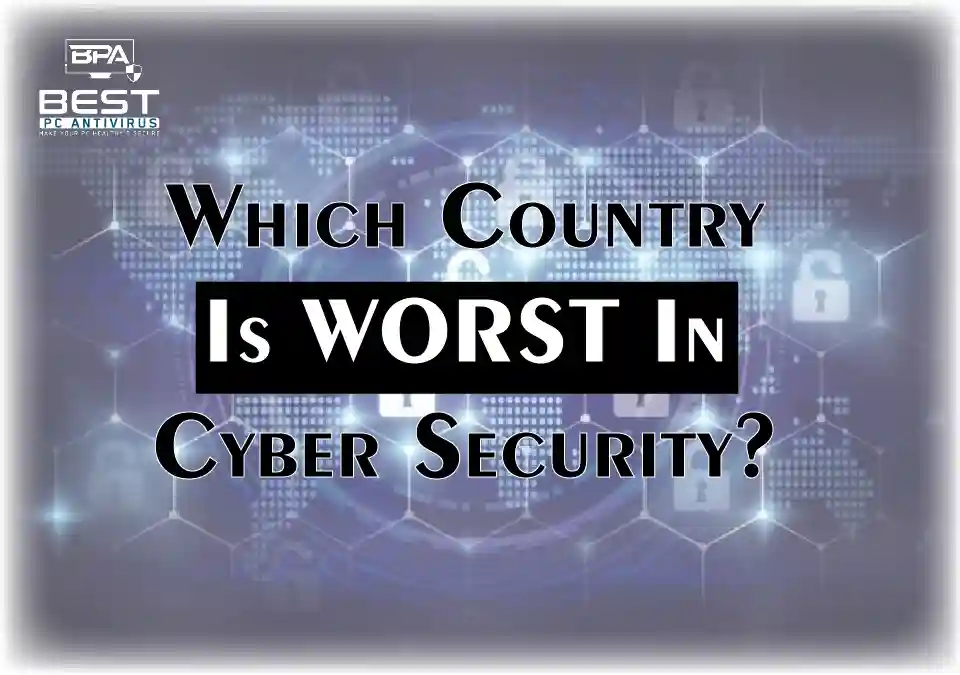“Which country is worst in Cyber Security?” Very harsh thing to ask, isn’t it? It isn’t about just pointing fingers at or making fun of such countries. That’s unproductive. What we should do is to see and learn what is making them weak, what’s causing the leak and make sure we learn from their mistakes. With that on mind, let’s dive right in-
What is Cyber Security and Why is Cyber Security Important?
Cybersecurity refers to the process of securing computer systems, networks, and sensitive information from unauthorised access, theft, damage, and other cyber threats. Technology is advancing so quickly that cybersecurity is now more crucial than ever. It is imperative to protect sensitive data, including financial information, intellectual property, and commercial and personal data. Data breaches, financial loss, identity theft, reputational damage, and even legal culpability are all potential outcomes of cyber attacks.
Strong passwords, antivirus software, routine software and security patch updates, firewall implementation, and data encryption can all be considered cybersecurity precautions. Furthermore in high demand are cybersecurity specialists, who are hired by businesses and organisations to manage their cybersecurity requirements and defend against online attacks. To ensure that data is kept safe and secure, cybersecurity solutions must also advance with technology.
What Makes a Country Strong in Cyber Security?
Attack Rates
A nation’s capacity to thwart cyberattacks is a key component of its cyber security strength. A nation with few successful cyberattacks demonstrates a robust defence mechanism and efficient management of cyberthreats. This can be done in a number of ways, including by enacting strict cyber security regulations, spending money on innovative technology, and hiring qualified cyber security specialists.
Defence System
Having a robust defence system to promptly detect and respond to cyberattacks is another essential component. Implementing firewalls, intrusion detection and prevention systems, and antivirus software are some examples of these measures. Artificial intelligence and machine learning algorithms can be used in a strong defence system to identify and neutralise threats in real time.
Infection Rates
Having a robust defence system to promptly detect and respond to cyberattacks is another essential component. Implementing firewalls, intrusion detection and prevention systems, and antivirus software are some examples of these measures. Artificial intelligence and machine learning algorithms can be used in a strong defence system to identify and neutralise threats in real time.
Legislation
Legislation is also an important factor in making a country strong in cybersecurity. Governments have the power to adopt rules and regulations that encourage safe and secure online behaviour and hold people and organisations responsible for their online behaviour.
These laws may deal with everything from cybercrime and national security to data protection and privacy. They can create guidelines for information exchange and incident response across government agencies as well as with businesses in the private sector.
For instance, the General Data Protection Regulation (GDPR) of the European Union is a set of rules that harmonises member states’ data protection legislation and establishes high requirements for the protection of personal data. Similar laws exist in the US to combat cybercrime and advance cybersecurity, such as the Computer Fraud and Abuse Act (CFAA) and the Cybersecurity Information Sharing Act (CISA).
A legal framework that can prevent hostile actors and create incentives for people and organisations to adopt good cybersecurity practices depends on effective legislation. In order for the digital economy and society as a whole to develop and flourish, it can also help to increase trust and confidence in digital technology and the online ecosystem.
International Cooperation
Cybersecurity is a worldwide issue that necessitates international cooperation in the linked world of today. Governments are typically regarded as having greater cyber security if they actively participate in international efforts to address cyber threats, such as sharing information on cyberattacks, coordinating responses, and setting up international cyber security standards.
Public Awareness
Finally, a robust cyber security culture can be created through increasing public awareness. People become more vigilant and less likely to become victims of cyber assaults when they are aware of the risks of cyber attacks and the precautions they might take to defend themselves. Governments can raise public knowledge of cyber security dangers and best practices through educational campaigns, training programmes, and other measures.
Tajikistan
Tajikistan is considered weak in the cybersecurity sphere due to various reasons, including:
Lack of Cybersecurity Policies:
Tajikistan does not have a comprehensive cybersecurity policy or a legal framework that deals with cybercrime. The country’s legislation is outdated and inadequate to address modern cybersecurity challenges. This leaves the country vulnerable to cyberattacks and makes it difficult to prosecute cybercriminals.
Limited Resources:
Tajikistan is a developing country with limited resources to invest in cybersecurity infrastructure and expertise. The country lacks trained cybersecurity professionals and the necessary technology to defend against cyber threats.
Low Awareness:
Many people in Tajikistan are not aware of the risks of cyber threats or the importance of cybersecurity. This lack of awareness makes them more vulnerable to cyberattacks, such as phishing scams and malware infections.
Poor Internet Infrastructure:
Tajikistan has poor internet infrastructure, which makes it difficult for the country to defend against cyber threats. The country’s internet penetration rate is low, and the quality of internet service is poor. This limits the effectiveness of cybersecurity measures that can be implemented.
According to the Global Cybersecurity Index 2020, Tajikistan ranked 188th out of 194 countries in terms of cybersecurity readiness. This low ranking is attributed to the country’s lack of cybersecurity policies, inadequate legislation, and limited resources.
The government of Tajikistan has taken some steps to improve cybersecurity, including the creation of a national cybersecurity center and the adoption of a national cybersecurity strategy in 2017. However, these efforts have been limited by the country’s limited resources and lack of expertise.
In recent years, Tajikistan has also experienced several high-profile cyber incidents, including a major cyberattack on the country’s main telecoms provider in 2019. These incidents have highlighted the need for stronger cybersecurity measures in the country.
Tajikistan’s low ranking in cybersecurity readiness underscores the need for the country to invest more resources in cybersecurity infrastructure and expertise, as well as to update its legal framework and raise public awareness of the risks of cyber threats.
Bangladesh
Bangladesh is considered weak in the cyber security sphere due to various reasons:
Lack of Awareness:
There is a lack of awareness and education among the general public about cyber security. This results in individuals not taking necessary precautions, such as using strong passwords, keeping software up-to-date, and avoiding phishing scams.
Insufficient Regulations:
The country lacks comprehensive legal and regulatory frameworks for cyber security. The existing laws and policies are often outdated and not in line with international standards. There is also limited enforcement of cybercrime laws, which results in a low deterrence effect.
Poor Infrastructure:
Bangladesh’s ICT infrastructure is still developing, and the country is heavily reliant on outdated and vulnerable technologies. This makes it easier for cyber criminals to exploit vulnerabilities in the country’s systems and networks.
Limited Resources:
The government has limited resources to invest in cyber security infrastructure and initiatives. This means that the country is unable to keep up with rapidly evolving cyber threats and invest in the latest technologies and practices.
According to the Global Cybersecurity Index (GCI) 2020, Bangladesh ranks 141 out of 194 countries in terms of cyber security preparedness. The country has a score of 0.275 out of a possible 1, indicating a low level of cyber security maturity.
To address these issues, Bangladesh has taken some initiatives in recent years to strengthen its cyber security:
National Cyber Security Policy: The government has introduced a National Cyber Security Policy to address the growing cyber threats in the country. The policy aims to create a legal and regulatory framework for cyber security, establish a national cyber security agency, and promote public awareness and education on cyber security.
CERT-BD: The Computer Emergency Response Team Bangladesh (CERT-BD) was established in 2013 to respond to cyber security incidents and coordinate with other international CERTs. CERT-BD also conducts cyber security training and awareness programs for government agencies, private sector organizations, and individuals.
Cyber Tribunal: Bangladesh has established a Cyber Tribunal to address cybercrime cases and enforce the country’s existing cybercrime laws. The tribunal has the authority to prosecute cyber criminals and impose penalties for cybercrime offences.
While these initiatives are steps in the right direction, more needs to be done to improve the country’s cyber security preparedness and protect its citizens, businesses, and critical infrastructure from cyber threats.
China
While China is a major player in the technology industry, it has been criticized for its cybersecurity practices. Some of the reasons why China is considered weak in the cybersecurity sphere include:
State-sponsored hacking:
The Chinese government has been accused of sponsoring hacking activities targeting foreign governments, companies, and individuals. Such activities have contributed to the country’s poor reputation in the cybersecurity sphere.
Lack of transparency:
The Chinese government has been criticized for its lack of transparency when it comes to its cybersecurity policies and practices. This lack of transparency makes it difficult for other countries to trust China’s cybersecurity initiatives.
Intellectual property theft:
China has been accused of stealing intellectual property from foreign companies, particularly in the technology industry. This has been a major point of contention between China and other countries, contributing to its poor reputation in the cybersecurity sphere.
Limited internet freedom:
The Chinese government has a strict control over the internet and censors content that it deems politically sensitive. This has resulted in limited internet freedom, which has been criticized by human rights advocates and technology companies alike.
Cybercrime:
China is also home to a large number of cybercriminals who engage in activities such as hacking, identity theft, and online fraud. The country has been criticized for not doing enough to address this issue.
In recent years, China has taken steps to improve its cybersecurity practices, including the enactment of cybersecurity laws and regulations. However, it will take time for China to change its reputation in the cybersecurity sphere and regain the trust of other countries.
FAQs
What is Cybersecurity?
Cybersecurity refers to the process of securing computer systems, networks, and sensitive information from unauthorized access, theft, damage, and other cyber threats.
What is the General Data Protection Regulation (GDPR)?
The General Data Protection Regulation (GDPR) of the European Union is a set of rules that harmonizes member states’ data protection legislation and establishes high requirements for the protection of personal data.
What is the Computer Fraud and Abuse Act (CFAA)?
The Computer Fraud and Abuse Act (CFAA) is a law in the US that prohibits unauthorized access to computer systems and networks, as well as the theft or destruction of data.
What is the Cybersecurity Information Sharing Act (CISA)?
The Cybersecurity Information Sharing Act (CISA) is a law in the US that facilitates the sharing of cybersecurity threat information between government agencies and private entities.
What is the Global Cybersecurity Index 2020?
The Global Cybersecurity Index 2020 is a report that ranks countries based on their cybersecurity readiness. It takes into account factors such as cybersecurity policies, legislation, resources, and public awareness.
Read More : How to Avoid Technical Support Scams




